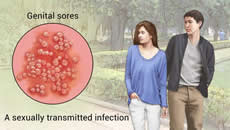Genital Herpes
 | Genital Herpes is a common sexually transmitted infection marked by genital pain and sores which is caused by the herpes simplex virus. The disease can affect both men and women. |
What is it?
- Caused by the herpes simplex virus (HSV), the same type of virus that causes cold sores
- Often acquired without symptoms
- Initial episodes may be severe and prompt treatment is recommended
- More than 50% of initial genital episodes are now caused by herpes simplex virus (HSV) type 1
- Recurrences are usually mild or asymptomatic and may not require treatment
- Symptomatic recurrences may be treated with suppressive or episodic therapy
- Symptomatic and/or frequent recurrences may be treated with suppressive or episodic therapy
Signs and Symptoms
Genital Herpes can cause outbreaks of blisters or sores on the genitals and anus. Once infected, you can continue to have episodes of symptoms throughout your life. Most people infected with Genital Herpes have no symptoms, but some people can experience:
- Stinging or tingling in the genital area
- Small blisters on the genital area which develop into small painful red sores
- Sores that look like a rash or cracked skin on the genitals
- Difficulty passing urine
The first episode of infection can also have flu-like symptoms such as:
- Fever
- Headache
- Swollen glands
Diagnosis
The doctor will take a swab from a blister or sore to check for herpes simplex virus. It is best if the blister is less than 4 days old.
Treatment
- There is no cure for Genital Herpes. However, it is possible to reduce the symptoms using anti-viral medicine which is most effective when started within 72 hours of the first symptoms
- Medicines can help control outbreaks if they are frequent or severe. Anti-viral medicine can reduce the risk from passing the virus on your sexual partner
Recommended follow-up
- Simple analgesia and antipyretics
- Saline bathing
- Topical lignocaine reduces pain from erosions
- Urinating in a bath or shower relieves superficial dysuria
- Encourage condom use with ongoing partners
- Consider testing for other STI's at three-month visit, if not undertaken at first presentation or retesting post window period
Contact tracing
- Contact tracing is not recommended for Genital Herpes
- Avoid risk of transmission to pregnant women in third trimester